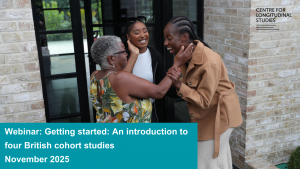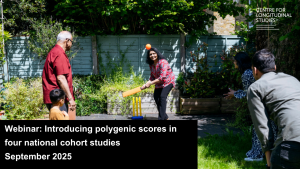
George Ploubidis
Professor of Population Health and Statistics, and Director of the National Child Development Study and 1970 British Cohort Study
Email: g.ploubidis@ucl.ac.uk
On this page:
The 1970 British Cohort Study (BCS70) is following the lives of around 17,000 people born in England, Scotland and Wales in a single week of 1970.
Over the course of participants’ lives, BCS70 has collected information on health, physical, educational and social development, and economic circumstances among other factors.
BCS70 is core funded by the Economic and Social Research Council.
If you are a BCS70 participant, please visit the BCS70 website.
Introduction to BCS70
This essential webinar gives first-time users and researchers less familiar with the 1970 British Cohort Study (BCS70) an insight into this invaluable longitudinal cohort dataset.
Runtime 1:12:46
BCS70 follows the lives of all people born in England, Scotland and Wales in one particular week in 1970. During the birth sweep, information was collected about 16,568 babies born in England, Scotland and Wales.
Those born in Northern Ireland (a further 628) were included in the birth sweep, but were not followed up in any of the subsequent sweeps.
At ages five, 10 and 16, the sample was augmented with those who had been born overseas in the relevant week and subsequently moved to Great Britain. This resulted in 79 new recruits at age five, 294 at age 10 and 65 at 16.
Cohort profile
There are two BCS70 cohort profiles. The first one covers the period from 1970–2004.
Elliott, J. and Shepherd, P. (2006). ‘Cohort Profile: 1970 British Birth Cohort (BCS70)’.
International Journal of Epidemiology, volume 35, issue 4, p836–843, doi: /10.1093/ije/dyl174.
Cohort profile
The second cohort profile covers the period from 2008–2021.
Sullivan, A., Brown, M., Hamer, M. and Ploubidis, G. (2022). ‘Cohort Profile Update: The 1970 British Cohort Study (BCS70)’. International Journal of Epidemiology, vol 52, issue 3, doi: /10.1093/ije/dyac148.
Response and missingness
Find out more about the level of response for every sweep of BCS70, important predictors of non-response, and how to handle missing data in the study.
Explore the data
Find a range of tools and resources to help you explore BCS70 data at each sweep.
Access the main study data
Most BCS70 data are available for free via the UK Data Service [SN 200001]
Access specialised data
Some specialised data are available from other public data repositories or directly from CLS.
CLS provides expert training for BCS70 data users of all experience levels. Check out all the webinars available on our YouTube channel.

Getting started: An introduction to four British cohort studies
New to the CLS cohort studies? This webinar recording will give you an overview of four internationally renowned national cohort studies and the wide range of opportunities they offer to researchers.
Runtime 1:19:59

Introducing polygenic scores in four national cohort studies (2025)
Discover the range of new polygenic scores available in the CLS cohort studies and find out what these data can be used for.
Runtime 41:31:00
1970 British Cohort Study at age 51: explore the new data (2025)
In this webinar recording, explore the latest data available from the 1970 British Cohort Study at age 51 and discover the value of this national cohort study for research into midlife and ageing.
Runtime 45:23
Cognitive ability
BCS70 has tracked cognitive ability and function across the life course. Find out more in CLOSER’s guide to the cognitive measures in BCS70 and four other cohort studies.
Covid-19 surveys
Data are available from three surveys carried out during the pandemic with BCS70 and four other cohort studies.
Genetic data and biological samples
Genotyped data from over 5,500 BCS70 cohort members, obtained from biological samples collected at age 46, are available for research.
Geospatial data
A range of geospatial data can be linked to BCS70 survey data using cohort members’ location information. Examples include data on local amenities, such as green space or fast food restaurants, and information on pollution and the weather.
Linked health data
Researchers can access administrative health data linked to BCS70 survey data. These include Hospital Episode Statistics and information from Scottish Medical Records.
In addition to the main BCS70 sweeps there have been a number of substudies:

George Ploubidis
Professor of Population Health and Statistics, and Director of the National Child Development Study and 1970 British Cohort Study
Email: g.ploubidis@ucl.ac.uk
George is Professor of Population Health and Statistics at the UCL Social Research Institute and currently holds the posts of Principal Investigator of the National Child Development Study and 1970 British Cohort Study at the Centre for Longitudinal Studies. Prior to joining UCL he held posts at the London School of Hygiene and Tropical Medicine and the University of Cambridge. George is a multidisciplinary quantitative social scientist and a longitudinal population surveys methodologist. His main research interests relate to socioeconomic and demographic determinants of health over the life course and the mechanisms that underlie generational differences in health and mortality. His methodological work in longitudinal surveys focusses on applications for handling missing data, causal inference and measurement error.